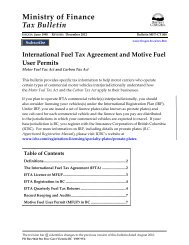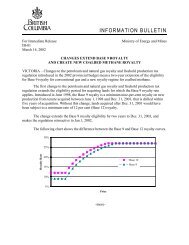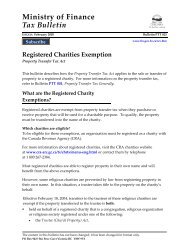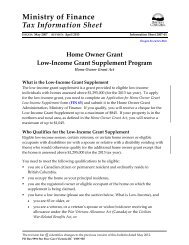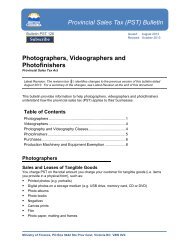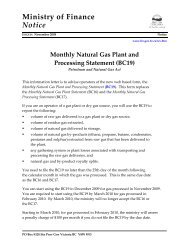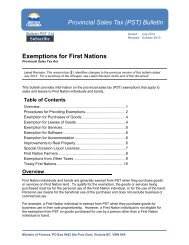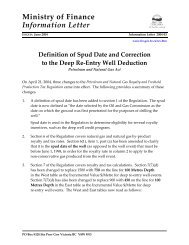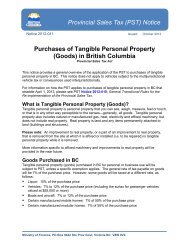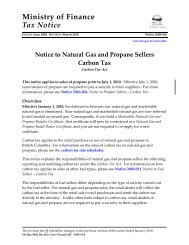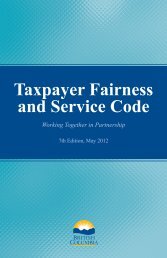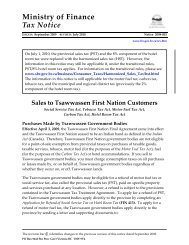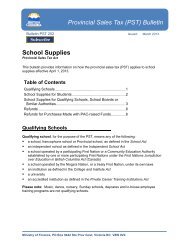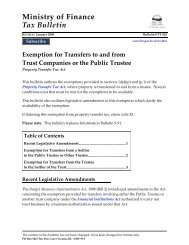You also want an ePaper? Increase the reach of your titles
YUMPU automatically turns print PDFs into web optimized ePapers that Google loves.
Ministry of Finance<br />
Tax <strong>Bulletin</strong><br />
ISSUED: July 2010 Revised: May 2013 <strong>Bulletin</strong> <strong>MFT</strong>-<strong>CT</strong> <strong>002</strong><br />
gov.bc.ca/consumertaxes<br />
Sales to Status Indians and Indian Bands, and the<br />
Exempt Fuel Retailer Program<br />
Motor Fuel Tax Act and Carbon Tax Act<br />
This bulletin provides specific tax information to help fuel sellers understand how the<br />
motor fuel tax and carbon tax apply on sales to status Indians and Indian bands. This<br />
bulletin also explains when fuel sellers may qualify for the Exempt Fuel Retailer<br />
Program and how to register as an exempt fuel retailer under the program.<br />
For general information for all fuel sellers, such as the different registration<br />
requirements and fuel seller classifications, please see <strong>Bulletin</strong> <strong>MFT</strong>-<strong>CT</strong> 001, Fuel<br />
Sellers.<br />
Table of Contents<br />
Definitions .........................................................................................1<br />
Sales to Eligible Purchasers ...........................................................2<br />
Refunds of Security Paid ................................................................4<br />
Exempt Fuel Retailer Program .......................................................5<br />
Definitions<br />
An eligible purchaser is:<br />
• a person who qualifies as an Indian under the Indian Act (Canada), or<br />
• a person who makes a purchase on behalf of a band that qualifies as a band (the<br />
eligible purchaser) under the Indian Act (Canada).<br />
The following do not meet the definition of an eligible purchaser:<br />
• Métis peoples, Inuit or Indians from the United States, as they do not meet the<br />
definition of an Indian under the Indian Act (Canada),<br />
The revision bar ( ) identifies changes to the previous version of this bulletin dated October 2010.<br />
PO Box 9442 Stn Prov Govt Victoria BC V8W 9V4
• corporations or cooperatives with Indian shareholders, tribal councils and band<br />
empowered entities, as they do not qualify as Indians under the Indian Act (Canada),<br />
• a person who qualifies as an eligible purchaser but is purchasing fuel for another<br />
person, or planning to sell or transfer ownership of the fuel to another person for<br />
their use,<br />
• effective June 1, 2008, Nisga’a citizens, Nisga’a bands and any other purchaser,<br />
including eligible purchasers, buying fuel on Nisga’a lands. Nisga’a citizens are<br />
Nisga’a individuals included in the Nisga’a Final Agreement. Under the Nisga’a<br />
Final Agreement, Nisga’a lands are not considered reserve lands, and<br />
• effective April 3, 2009, Tsawwassen First Nation band. Under the Tsawwassen First<br />
Nation Agreement, Tsawwassen First Nation band ceased to be an Indian band as<br />
defined under the Indian Act (Canada) and Tsawwassen lands are not considered<br />
reserve lands.<br />
Exempt fuel retailer (EFR) is a fuel seller who operates on reserve land and has<br />
received authorization from the ministry to purchase gasoline, diesel and/or propane<br />
exempt of security under the Exempt Fuel Retailer Program.<br />
Reserve land is land that qualifies as a reserve or designated land under the Indian<br />
Act (Canada).<br />
Please note: Although Tsawwassen First Nation band pays motor fuel tax and carbon<br />
tax, individual Tsawwassen members who have a valid Certificate of Indian Status Card<br />
are still exempt from motor fuel tax and carbon tax for purchases made on reserve until<br />
April 30, 2017. Tsawwassen lands that were formerly reserve lands are treated as<br />
reserve lands for this purpose for the same period.<br />
Under certain circumstances, Nisga’a Nation and Tsawwassen First Nation government<br />
bodies may apply for a refund of motor fuel tax paid. The refund does not apply to<br />
carbon tax. For more information, please see <strong>Bulletin</strong> GEN 013, Provincial Taxes on<br />
Nisga’a Lands and Notice 2009-003, Sales to Tsawwassen First Nation Customers.<br />
Sales to Eligible Purchasers<br />
Eligible purchasers are exempt from motor fuel and/or carbon tax when the sale takes<br />
place on reserve land. A sale is considered to take place on reserve land when:<br />
• the fuel seller and eligible purchaser are physically located on reserve land, e.g. a<br />
retail gas station, or<br />
• the fuel seller is located off reserve land, but a condition of the sale is that the<br />
eligible purchaser takes possession of the fuel, by way of delivery, on reserve land.<br />
Sales to Status Indians and Indian Bands, and the Exempt Fuel Retailer Program Page 2 of 9
Exempt Sale Procedures<br />
When you sell fuel to an eligible purchaser on reserve land, you must verify that the<br />
purchaser is eligible to purchase fuel exempt of tax. To verify the purchaser’s eligibility:<br />
• the purchaser must possess and physically present you with their Certificate of Indian<br />
Status card, or<br />
• the purchaser, if recently registered as an Indian and they have not received their<br />
status card, must possess and physically present you with their Temporary<br />
Confirmation of Registration Document (TCRD) issued by Aboriginal Affairs and<br />
Northern Development Canada (AANDC). The original TCRD must show their<br />
name, registration number, registration date and the expiration date of the TCRD.<br />
The purchaser must also show a piece of government-issued photo identification.<br />
Acceptable identification includes a passport, driver’s licence or BCID card.<br />
For a sample of the TCRD, please see AANDC’s website at www.ainc-inac.gc.ca<br />
/br/is/bll/ir_tmp-eng.asp.<br />
• if the purchaser is purchasing fuel as an agent on behalf of a band, you must verify<br />
that the person is eligible to purchase the fuel on behalf of the band. To verify the<br />
person’s eligibility, they must provide you with written authorization from the<br />
band, which contains the band’s name and registry number, the name, signature and<br />
title of the band official who provided the written authorization. The written<br />
authorization should state the following:<br />
“This is to certify that the fuel purchased by (name of the band) on (name of reserve) are<br />
solely for band management activities and are exempt from motor fuel and carbon<br />
tax.”<br />
For each exempt sale, you must record all of the following information on the invoice.<br />
• The date of the sale.<br />
• The purchaser’s name and registry number as shown on the Certificate of Indian<br />
Status card. If the purchase is made on behalf of a band, the purchaser’s name, the<br />
band’s name and band registry number as it appears on the authorization letter from<br />
the band, and the name of the band official who signed the letter.<br />
• The quantity and type of fuel sold exempt of tax.<br />
• The reserve name and/or physical address where the exempt fuel was sold. If the<br />
fuel seller is not permanently located on reserve land, a statement that as a condition<br />
of the sale, the fuel is to be delivered by the fuel seller into a receptacle (e.g. fuel<br />
tank) located on reserve land.<br />
• The purchaser’s signature confirming the above information.<br />
Sales to Status Indians and Indian Bands, and the Exempt Fuel Retailer Program Page 3 of 9
If you are a fuel seller who is permanently located on reserve land, e.g. a retail gas<br />
station or cardlock, you must record the above information on the Schedule of Sales of<br />
Tax-Exempt Fuels to Indians or Indian Bands form (FIN 412/2). If the purchase is made on<br />
behalf of a band, the band’s name and band registry number must be recorded. You<br />
must submit the form along with your tax return.<br />
Please note: You must report exempt sales from cardlock locations on reserve land for<br />
the month in which the sale occurs (i.e. not the billing or payment date). The FIN 412/2<br />
may be submitted after the tax return, but must be received by the ministry no later<br />
than the last day of the month the tax return is due (e.g. for March cardlock sales, the<br />
tax return is due April 15 and the FIN 412/2 for these sales must be received no later<br />
than April 30). Faxed, or scanned and emailed copies of the FIN 412/2 are acceptable.<br />
If you cannot collect and record the above information, you must collect the motor fuel<br />
and/or carbon tax from the purchaser. If the purchaser claims they are purchasing fuel<br />
on behalf of a friend or family member who is an eligible purchaser, but the purchaser<br />
does not possess a Certificate of Indian Status card in their own name, you must collect<br />
the motor fuel and/or carbon tax.<br />
If you are required to collect the tax, as in the situations above, and your customer<br />
claims they are eligible for exemption, they may apply to the ministry for a refund. To<br />
apply for a refund of motor fuel tax paid, they submit an Application for Refund of Motor<br />
Fuel Tax - Purchaser of Fuel form (FIN 147). To apply for a refund of carbon tax paid,<br />
they submit an Application for Refund of Carbon Tax - Purchaser of Fuel form (FIN 108).<br />
Please note: If you are a fuel seller who operates at a permanent location on reserve<br />
land, e.g. a retail gas station or cardlock, you may qualify to purchase a portion of your<br />
fuel exempt of security under the Exempt Fuel Retail Program (see the section below,<br />
Exempt Fuel Retailer Program).<br />
Refunds of Security Paid<br />
Deputy collectors and retail dealers are required to pay a security equal to the amount<br />
of tax that would have been collected if the fuel was sold to an end purchaser.<br />
If you are a deputy collector and you sell fuel exempt of security to an EFR, or you<br />
are a retail dealer and you sell fuel exempt of tax to an eligible purchaser, you may<br />
apply for a refund of the security you paid. The refund amount is based on the<br />
difference between the amount of security you paid on the fuel and the amount of<br />
security or tax you collected. For information on how to claim a refund, please see<br />
<strong>Bulletin</strong> <strong>MFT</strong>-<strong>CT</strong> 001, Fuel Sellers.<br />
Sales to Status Indians and Indian Bands, and the Exempt Fuel Retailer Program Page 4 of 9
Exempt Fuel Retailer Program<br />
The EFR Program was introduced to allow retailers to purchase fuel exempt of security<br />
that will be resold tax-exempt to eligible purchasers.<br />
As an EFR, you are authorized to purchase a specified percentage of certain types of<br />
fuel exempt of security. Your specified percentage is based on the tax-exempt sales that<br />
you normally make to eligible purchasers. The specified percentage may vary by the<br />
type of fuel and may be adjusted if a change in your percentage of tax-exempt sales<br />
emerges over a longer term.<br />
How to Apply<br />
You may apply to the ministry to register as an EFR, if you sell:<br />
• one or more of the following types of fuel:<br />
• clear or coloured gasoline,<br />
• clear or coloured diesel fuel, and<br />
• propane effective April 1, 2013,<br />
• from a permanent location on reserve land (a retail gas station or an unmanned<br />
location, e.g. cardlock or keylock), and<br />
• sell at least 10% of a type or types of fuel listed above exempt of tax to eligible<br />
purchasers.<br />
To apply for registration as an EFR, you need to complete an Application for Registration<br />
as an Exempt Sale Retail Dealer (ESRD) and/or Exempt Fuel Retailer (EFR) form (FIN 262)<br />
for each physical location that you operate on reserve land.<br />
If you are conditionally approved as an EFR, the ministry will send you two copies of a<br />
draft agreement outlining the duties and conditions of your registration. If you agree<br />
with the duties and conditions, you must sign and return both copies of the agreement<br />
to the ministry. The ministry will return one copy of the agreement to you for your<br />
records along with:<br />
• an Exempt Fuel Retailer Permit with your name, address and permit number, as well<br />
as the type(s) of fuel and specified percentage of each type of fuel that you can<br />
purchase exempt of security, and<br />
• tax return forms and information you need to report and remit tax.<br />
If you are not approved as an EFR, the ministry will send you a letter explaining why<br />
your application was refused and how to appeal the decision if you disagree. If your<br />
application is refused, you are not authorized to purchase any gasoline and/or diesel<br />
exempt of security in BC.<br />
Sales to Status Indians and Indian Bands, and the Exempt Fuel Retailer Program Page 5 of 9
Suspension and Cancellation of EFR Permits<br />
If your permit is suspended or cancelled for not meeting the conditions of your EFR<br />
permit agreement, you will not be eligible to purchase any fuel exempt of security.<br />
However, if your permit is suspended or cancelled, you must continue to file your<br />
monthly returns until all of your fuel that was purchased exempt of security has been<br />
sold.<br />
Please note: The ministry has created a website to allow fuel sellers to monitor the<br />
status of EFR permits. For information on how fuel sellers use this website, please see<br />
<strong>Bulletin</strong> <strong>MFT</strong>-<strong>CT</strong> 001, Fuel Sellers.<br />
Display of Permits<br />
You are required to display your EFR permit at each location where you sell fuel. The<br />
permit indicates the specific type(s) of fuel and the percentage of each fuel type the<br />
location is authorized to purchase exempt of security.<br />
Purchasing Fuel for Resale<br />
To purchase the specified percentage of each fuel type listed on your EFR permit<br />
exempt of security, at the time of purchase you must provide your fuel supplier with<br />
your EFR number, fuel type(s) and specified percentage, or a copy of the permit.<br />
Exempt Sales<br />
Like other fuel sellers, you are required to verify that your customer is eligible to<br />
purchase fuel exempt of tax (see the section above, Exempt Sale Procedures).<br />
Taxable Sales<br />
You are required to collect the motor fuel and/or carbon tax at the appropriate rate on<br />
all types of fuel sold to purchasers who do not qualify to purchase fuel exempt of tax.<br />
Reporting and Remitting Tax<br />
You are required to report your inventory, purchases and sales, for the types of fuel<br />
for which you have been appointed an EFR, on a Tax Return – Exempt Fuel Retailer<br />
form (FIN 412) and remit any tax that is due on those sales to the ministry by the<br />
15 th day of the month following the month that you sold the fuel. For example, if you<br />
sell fuel anytime during the month of November, you are required to submit the return<br />
and remit any tax due by December 15. You must also submit your Schedule of Sales of<br />
Tax-Exempt Fuels to Indians or Indian Bands form (FIN 412/2). If you have no sales, you<br />
are still required to submit your tax return.<br />
Sales to Status Indians and Indian Bands, and the Exempt Fuel Retailer Program Page 6 of 9
If you send in your return and payment by mail, it is considered on time if the envelope<br />
is postmarked by Canada Post on or before the due date. A business postage meter<br />
mark is not sufficient. If you hand deliver your tax return or send it by courier, it must<br />
be received by the ministry by the close of business (4:30 pm) on the due date to be<br />
considered on time. If your return and payment are not received on time, penalty and<br />
interest may be applied.<br />
If the due date falls on a weekend or statutory holiday in BC, your return and payment<br />
are due by 4:30 pm on the first business day after the due date.<br />
If the actual percentage of fuel that you sold exempt of tax is greater than the<br />
percentage of fuel that you purchased exempt of security, you are eligible for a refund<br />
of security on the difference in sales volumes. If the actual percentage of fuel that you<br />
sold exempt of tax is less than the percentage of fuel that you purchased exempt of<br />
security, you are required to remit the additional tax you collected to the ministry. You<br />
can either claim your refund or remit any additional tax collected on your tax return<br />
form.<br />
For example, you purchase 10,000 litres of clear gasoline exempt of security. You sell<br />
9,000 litres to eligible purchasers exempt of tax and 1,000 litres to taxable customers<br />
during the month of November 2012. The table below shows how to calculate the<br />
amount of tax you are required to remit to the ministry.<br />
Security-Exempt<br />
Purchases in Litres<br />
Tax-Exempt<br />
Sales in Litres<br />
Taxable Sales<br />
Volume of Fuel 10,000 9,000 1,000 litres<br />
Tax Rates<br />
Motor Fuel Tax<br />
Carbon Tax<br />
n/a<br />
n/a<br />
n/a<br />
n/a<br />
14.50<br />
+ 6.67<br />
= 21.17 cents per litre<br />
Tax to remit Exempt Exempt 1,000 litres<br />
x 21.17 cents per litres<br />
= $211.70<br />
Please note: The tax rates used above are examples only. The motor fuel tax rates vary<br />
depending on where you sell fuel in BC, e.g. inside the South Coast British Columbia<br />
transportation service region or the Victoria regional transit service area. For more<br />
information, please see <strong>Bulletin</strong> <strong>MFT</strong>-<strong>CT</strong> 005, Tax Rates on Fuels.<br />
Sales to Status Indians and Indian Bands, and the Exempt Fuel Retailer Program Page 7 of 9
Tax Rates<br />
The tax rates on fuel products change periodically. For the current motor fuel and<br />
carbon tax rates that apply to the various types of motor fuels used in internal<br />
combustion engines, and information on the carbon tax rates that apply to other fuels<br />
and combustibles, please see <strong>Bulletin</strong> <strong>MFT</strong>-<strong>CT</strong> 005, Tax Rates on Fuels. The tax rates are<br />
also printed on the Tax Return – Exempt Fuel Retailer form (FIN 412) and are mailed<br />
monthly to each EFR retailer.<br />
Tax Rate Changes<br />
If there is a tax rate change, you are required to report and remit any additional security<br />
due to the ministry on fuel inventory that you own, or are deemed to own, on which<br />
you have paid, or will be paying, security to your supplier (i.e. acting as a deputy<br />
collector or retail dealer).<br />
When motor fuel tax rates change, you use the applicable Motor Fuel Tax<br />
Return – Inventory form (FIN 154) to calculate and report your inventory and the<br />
amount of additional security due.<br />
When carbon tax rates change, you use the applicable Carbon Tax Return – Inventory<br />
form (FIN 103) to calculate and report your inventory and the amount of additional<br />
security due.<br />
If you are authorized to purchase 100% of a type of fuel exempt of security using your<br />
EFR permit, you are not required to submit an inventory return for that type of fuel.<br />
For more information, please see <strong>Bulletin</strong> <strong>MFT</strong>-<strong>CT</strong> 001, Fuel Sellers or contact the<br />
ministry.<br />
Reporting Tax on Sales Invoices<br />
You are required to report the amount of motor fuel and/or carbon security or tax<br />
charged on your sales invoices if you sell fuel:<br />
• from a bulk storage facility, cardlock or terminal rack,<br />
• for resale to another fuel seller,<br />
• to a registered consumer, registered air service or registered marine service, or<br />
• to a customer who requests an invoice.<br />
You must provide an invoice to your customer showing:<br />
• the date of the sale,<br />
• your name and address,<br />
• the location of the sale if different than above, and, if applicable, where the fuel was<br />
delivered,<br />
Sales to Status Indians and Indian Bands, and the Exempt Fuel Retailer Program Page 8 of 9
• the name and address of the person you sold the fuel to,<br />
• the quantity of each type of fuel sold, and<br />
• the rates for motor fuel tax and/or carbon tax for each type of fuel sold, as separate<br />
lines or columns on the invoice.<br />
There are additional invoice requirements if you sell coloured fuel. For more<br />
information, please see <strong>Bulletin</strong> <strong>MFT</strong>-<strong>CT</strong> 003, Coloured Fuels.<br />
Need more info?<br />
Online: gov.bc.ca/consumertaxes<br />
Toll free in Canada: 1 877 388-4440<br />
Email: <strong>CT</strong>BTaxQuestions@gov.bc.ca<br />
You can access our forms and publications online at gov.bc.ca/consumertaxes<br />
(go to Motor Fuel and Carbon Tax and then Forms or Publications)<br />
The information in this bulletin is for your convenience and guidance and is not a<br />
replacement for the legislation. You can find the Motor Fuel Tax Act, Carbon Tax Act,<br />
and regulations online under Publications.<br />
Sales to Status Indians and Indian Bands, and the Exempt Fuel Retailer Program Page 9 of 9



